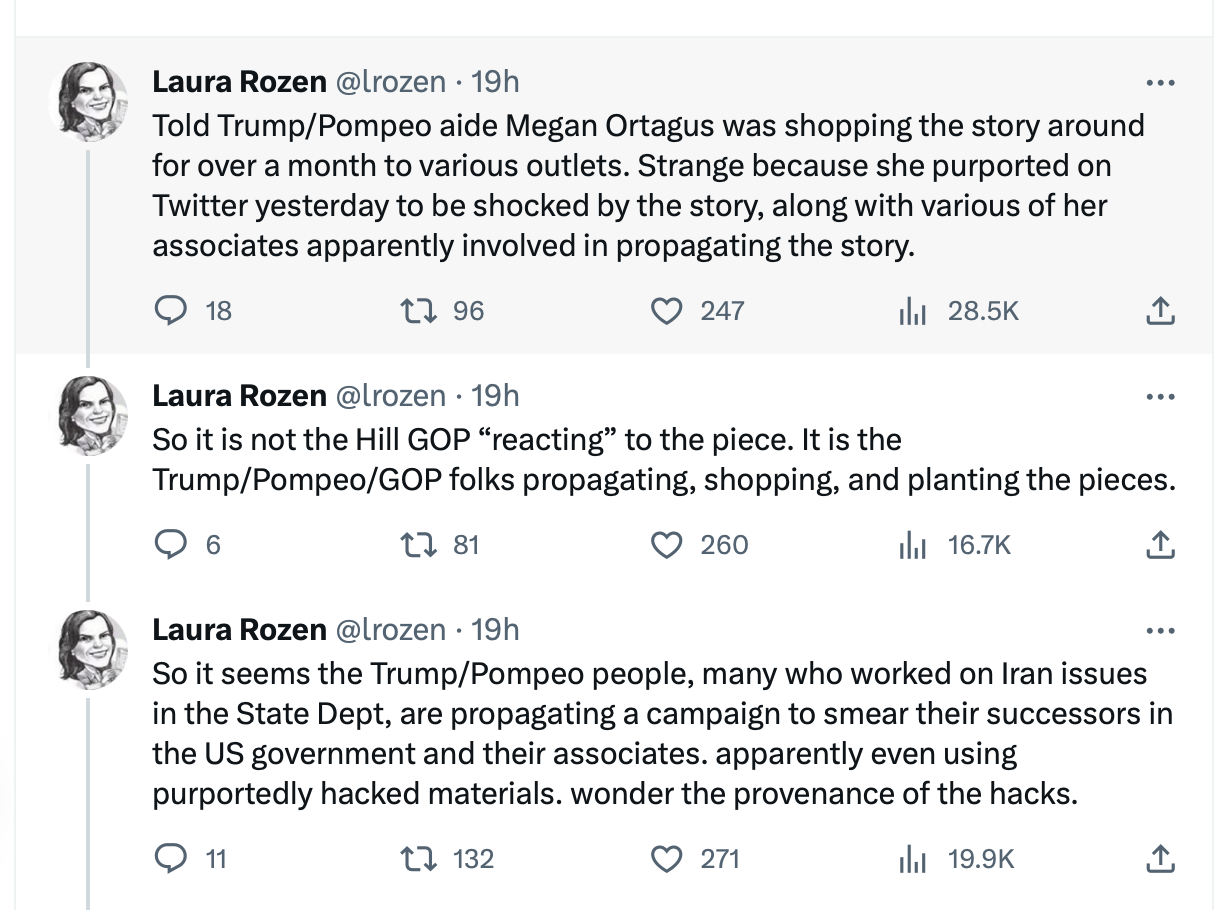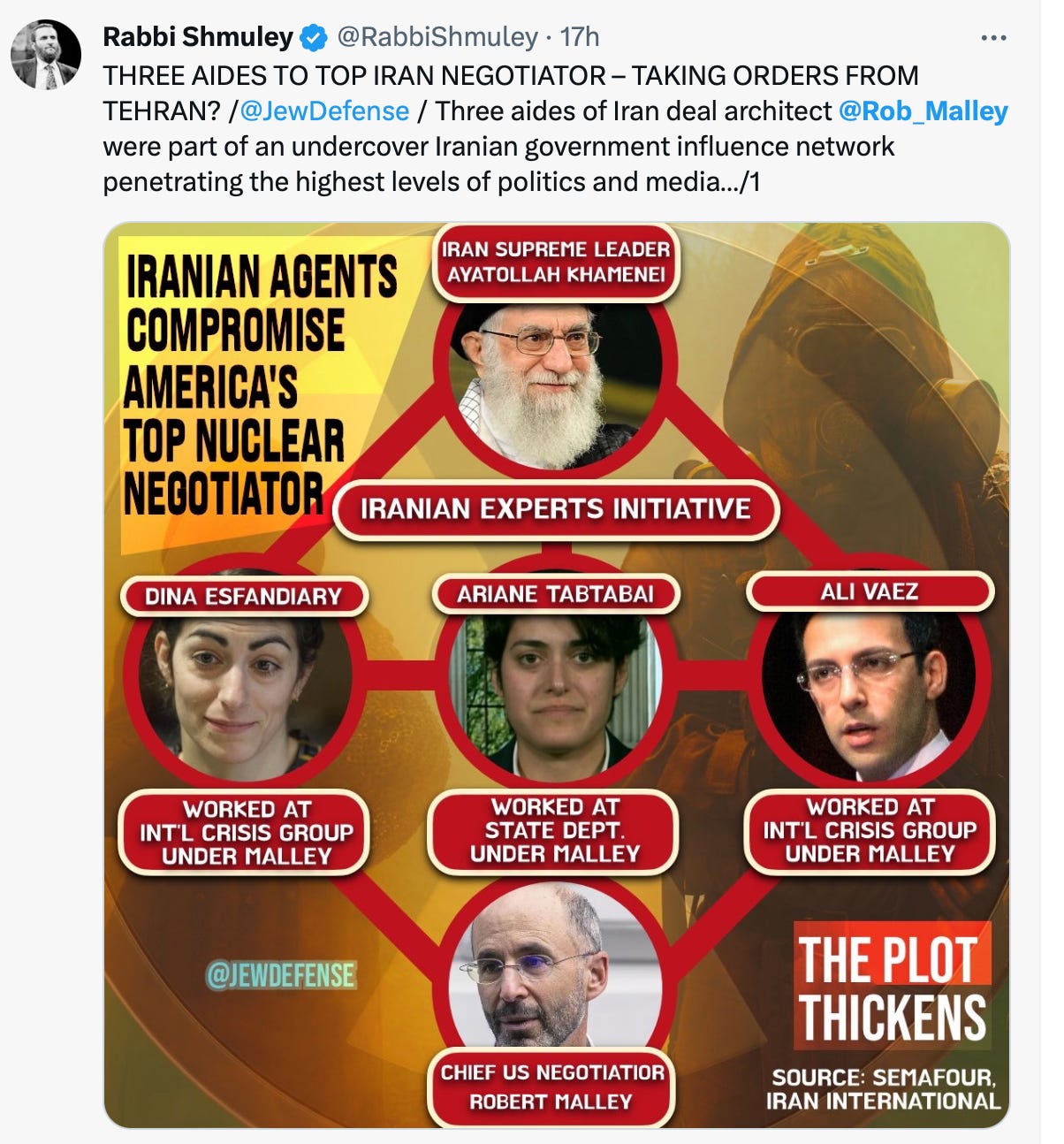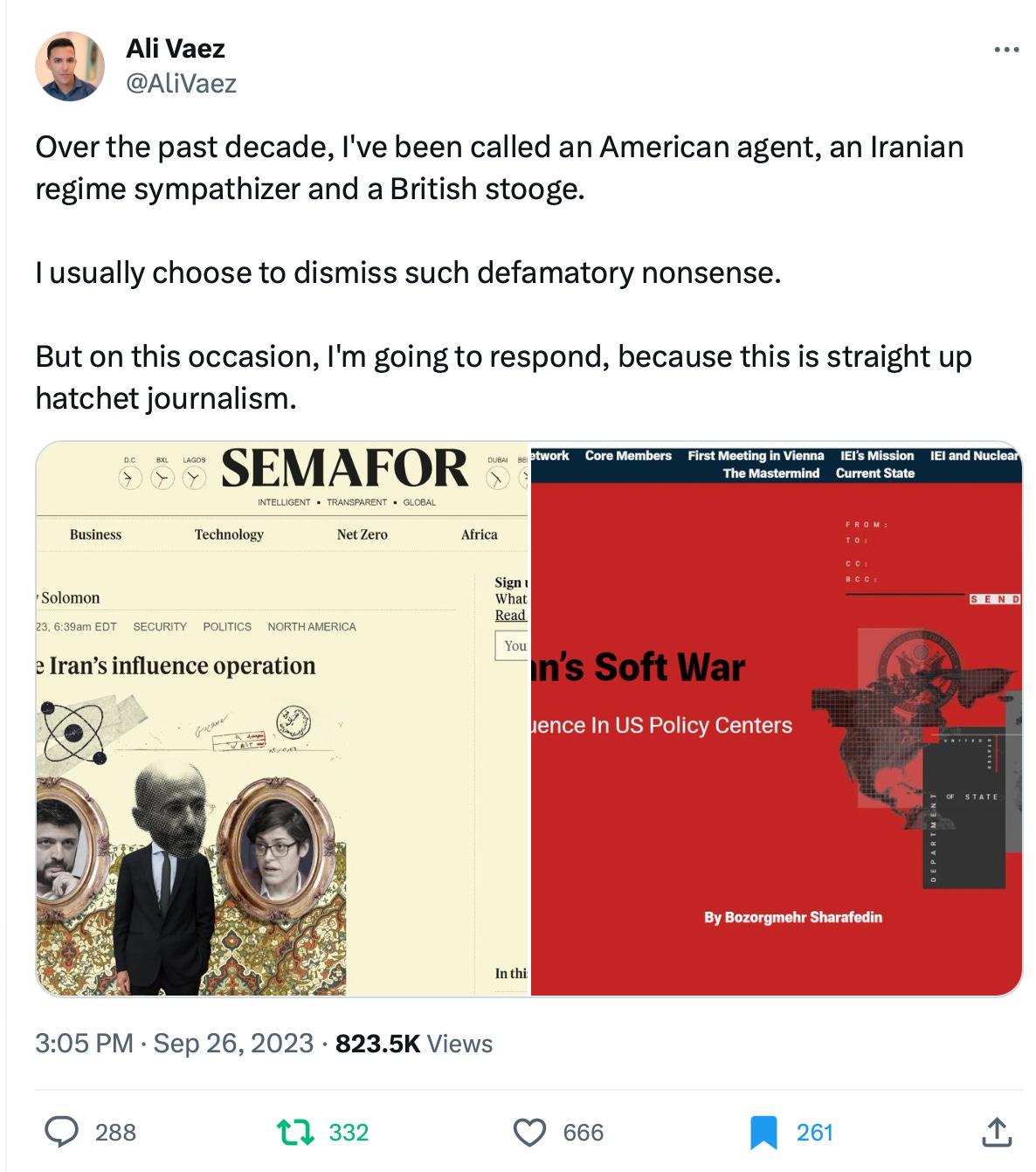Anatomy of a Smear Campaign
A promising Washington publication becomes the platform for vicious attacks on those working on Iran diplomacy.
It’s not easy being green, Kermit the Frog sang years ago. It’s not easy being a progressive national security analyst, either.
You are constantly fighting claims of being soft on U.S. adversaries because you may favor smaller military budgets and larger diplomatic efforts. If you are successful, you have to ward off attacks by groups generously funded by right-wing donors or foreign governments seeking to manipulate U.S. foreign policy.
A case in point is the outrageous claim this week that senior Biden administration officials working on Iran are actually “Iranian sleeper agents.”
This charge comes from Morgan Ortagus, former spokesperson for Secretary of State Mike Pompeo, supposedly reacting in shock to a lengthy article published Sept. 26 in the recently-launched and promising news platform, Semafor. Here, a researcher at the Atlantic Council's Digital Forensic Research Lab treats Ortagus’ claims skeptically:
Here’s the thing. Independent journalist Laura Rozen reports that Ortagus spent months shopping the article around, trying to find someone willing to spread this elaborate smear. (She misspells “Morgan” in the tweet.)
The Semafor article in question is by Jay Solomon, a long-time critic of diplomacy with Iran. He claims to have received hacked emails showing that policy experts working to contain Iran’s nuclear program, are actually stooges of the Iranian government. The article targets Ali Vaez, the director of Iran work at the prestigious International Crisis Group; Ariane Tabatabai, a Georgetown University professor and currently a special policy advisor at the Department of Defense; and Dina Esfandiary, a senior advisor at the International Crisis Group.
The real target of the smear, however, is Robert Malley, President Joe Biden’s Special Enjoy on Iran. Malley was involved in the negotiations for the historic Joint Comprehensive Plan of Action that rolled back and contained Iran’s nuclear program. He is also the former head of the International Crisis Group. He is currently on leave from the State Department after his security clearance was suspended over alleged mishandling of classified documents. The articles claim that all these experts were collaborating with Iran.
The goal is to discredit and isolate those favoring diplomacy. To scare Biden administration officials from any further diplomacy. To demonize routine expert travel and discussions as conspiracy. To launch Congressional investigations. To narrow the available policy choices down to one: military action.
The Semafor article was widely picked up by conservative media. The far-right Federalist claims “Malley has a real soft spot for the Islamic State and its allies.” It claims that Iran “recruited a network of fellow travelers to help the cause.”
Senator Ted Cruz, who may have know the article was coming out, quickly demanded sweeping investigations of a “vast Iranian influence operation.”
Americans have rightly been asking why the Biden administration is so friendly with the Iranian regime, and why Biden administration officials have so single-mindedly enabled Iranian nuclear progress and terrorism. These reports and emails suggest a vast Iranian influence operation that goes to the very top of the administration.
Congressional opponents of the Biden administration have peppered officials with questions and demands. Conservatives swarmed all over social media with wild claims and attacks on the Biden Administration.
But is any of this true?
The article, it turns out, was largely prepared by the London-based Iran International. Neither Semafor nor Jay Solomon reported that this network is funded by the Saudi royal family. The Guardian reported in 2018 that Crown Prince Mohammed bin Salman “is the force behind Iran International.” It details how “Iran International TV emerged abruptly on the London media scene last year; many of the 100-strong staff network were offered generous salaries, often double what rivals paid, but was elusive about its source of funding.”
The Wall Street Journal also reported on Saudi connections to Iran International and cites it as part of Riyadh’s effort “to build ties with Western news outlets to reshape its image, battle rivals.”
In an unusual arrangement, Iran International published its own version of the story the same day as Solomon’s Semafor piece, based on hacked emails somehow obtained by the group. Some of those emails, allegedly showing close cooperation between the experts and Iranian officials, are sprinkled throughout both articles and the subsequent amplifying stories.
Ironically, Jay Solomon was fired by The Wall Street Journal on the basis of leaked emails showing him engaged in unethical behavior: discussing business deals with one of his sources. Solomon claimed that the emails were “shopped around to media” in an effort to smear him.
He said in a statement, “This case illustrates how powerful individuals and entities can deploy vast resources and spend vast sums with the aim of silencing a journalist.” He said his emails were excerpted and stripped of context to present an image totally distorted from their actual meaning — precisely what he and Iran International appear to have done in their joint story.
Independent experts were quick to condemn the smear campaign, including former Washington Director for the International Institute for Strategic Studies Mark Fitzpatrick, former French Ambassador to the United States Gérard Araud, Middle East Program Director at the European Council on Foreign Relations Julien Barnes-Dacey, and Washington Post journalist Ishaan Tharoor, who warned that the experts were now “in the crosshairs” of an “influence operation that worked its way through a Western media outlet and now has GOP lawmakers up in arms.”
Ali Vaez did a lengthy Twitter thread rebutting all the allegations.
I have known each of these individuals for many years and worked with several of them on the successful Iran negotiations that shrank Iran’s nuclear program to a fraction of its former size and put it under the most intrusive inspection regime ever negotiated. It effectively eliminated the nuclear threat from Iran until Donald Trump recklessly withdrew from the deal. While I was president of Ploughshares Fund, our foundation funded several of these experts and the International Crisis Group. We always did extensive investigations of all our grantees. We never found a hint of what these critics claim.
Ironically, in a 2018 article for the Columbia Journalism Review, Solomon examined this tactic in a defense of his work after the Wall Street Journal fired him. He warned:
Leaks and hacks of emails and correspondences can blow up intricate reporting and derail months, if not years, of work. Information can be quickly weaponized to target journalists and their sources who are seeking to expose important truths. Iran, Russia, China, and other governments regularly use the internet to target and undermine the journalists reporting on them.
Yet, this is precisely what Solomon, Semafor, Iran International and the network of conservative organizations are doing today to these Iranian policy experts. The smear can be rebutted, their careers saved, but it will take months of work to clear their names. Their lives will be turned upside down. This new attack also raises questions about the charges of mishandling classified information that triggered Malley’s suspension. Was the charge part of this disinformation campaign?
But it could get worse than disinformation and career sabotage. This could be physical dangerous for those “in the crosshairs.”
The replies I got to my Twitter post criticizing the Semafor article offer a small sample of the invectives that will be hurled at them:
“Treason”
“Iran’s agents in the US have been exposed”
“Mullahs stooges”
“What is shocking is your blood washing for the Islamic Republic of Terror in Iran”
“You are a mullah lobby and implicated in this cult”
“Iranians will no longer stand by and watch your type ruin our country”
“Your time will come, too”
Like the violent rhetoric from Donald Trump and MAGA supporters, threats and vitriol from far-right opponents of the Iranian government are escalating. They target anyone working on diplomatic solutions to the various Iran crises. As I wrote earlier this week, their goal is regime change; they see any diplomatic engagement as legitimizing the Iranian regime. They favor the failed “maximum pressure” strategy employed by Pompeo and Trump, including military strikes on Iran.
On Sept. 27, I was at a Georgetown University panel discussion, co-sponsored by the Center for International Policy, on the suppression of the women’s movement in Iran. One of the speakers, Iranian-American journalist and analyst Negar Mortazavi, had to be provided with a security escort because of threats she had received. Last October, a panel she was on at the University of Chicago was delayed and moved online because of bomb threats.
Human rights groups report a steady increase of such threats. Human Rights Watch reported in 2021:
Recent targets include the Human Rights Watch Iran researcher, who has been subjected to a social media campaign filled with harassment, misinformation, and slander. A previous campaign run by IranDisinfo, a project that was temporarily funded by the US State Department [under Pompeo], targeted journalists, policy analysts, and human rights defenders with attacks that crossed the line into personal abuse. The legitimate frustration and anger created by Iranian authorities’ abuses does not justify attacking Iranians online with slander and threats of physical violence.
These journalists, analysts and officials are tough. All, sadly, have be forced to take steps to protect themselves. None have been intimidated by the hate campaigns. They are still active, still talking, still working for peaceful solutions.
They may feel a little like Kermit feels at the end of his soulful lament on the difficulty of being who he is. It isn’t easy, but “it’ll do fine. And it’s beautiful. And I think it’s what I want to be.”
The least we can do is support these experts, protect them, and urge news organizations to stop cooperating with choreographed hate campaigns against them.








